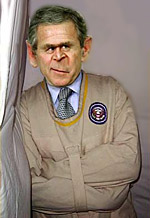 President Bush said last week that telecommunications companies that helped government wiretapping efforts need protection from "class-action plaintiff attorneys" who see a "financial gravy train" ahead. Democrats and privacy groups responded by accusing the Bush administration of trying to shut down the lawsuits to hide evidence of illegal acts.
President Bush said last week that telecommunications companies that helped government wiretapping efforts need protection from "class-action plaintiff attorneys" who see a "financial gravy train" ahead. Democrats and privacy groups responded by accusing the Bush administration of trying to shut down the lawsuits to hide evidence of illegal acts.
But in the bitter Washington dispute over whether to give the companies legal immunity, there is one thing on which both sides agree: If the lawsuits go forward, sensitive details about the scope and methods of the Bush administration's surveillance efforts could be divulged for the first time.
Nearly 40 lawsuits, consolidated into five groups, are pending before a San Francisco judge. The various plaintiffs, a mix of nonprofit civil liberties advocates and private attorneys, are seeking to prove that the Bush administration engaged in illegal massive surveillance of Americans' e-mails and phone calls after the Sept. 11, 2001, terrorist attacks, and to show that major phone companies illegally aided the surveillance, including the disclosure of customers' call records.
If the cases are allowed to proceed, plaintiffs' attorneys say, the courts could review, in secret if necessary, any government authorizations for the surveillance. The process might also force the disclosure of government memos, contracts and other documents to a judge, outlining the legal reasoning behind the warrantless wiretapping program.